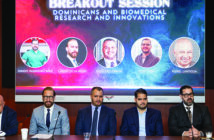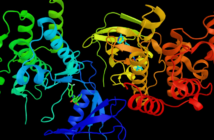The Medical School’s deputy Title IX officer works to address sexual discrimination and violence.
As many as one in four college students is sexually assaulted and many more may suffer discrimination and harassment. Medical schools are not immune. Last year, Brown University created a Title IX office to track and prevent sexual assaults and gender-based discrimination. In October 2015 Assistant Professor of Psychiatry and Human Behavior (Research) Lindsay Orchowski, PhD, was appointed the deputy Title IX coordinator for Alpert Medical School. What began as an undergraduate interest in helping fellow students who had been assaulted eventually led Orchowski to a doctorate in clinical psychology and academic research in gender studies, sexual assault prevention, and victim advocacy. She spoke to Brown Medicine about the professional expertise and guidance she offers for everyone—women, men, students, and faculty.
What is the mission of the Title IX Office?
The goal of the Title IX Office is to ensure that all survivors of sexual- and gender-based harassment and assault receive appropriate resources, to oversee ongoing prevention and education activities, and to connect students to their options for pursuing the on- and offcampus complaint processes. The establishment of a Title IX office at Brown helps to ensure that all students receive this information, by directing all reports to a central location. It is important that institutions are tracking any kind of systemic patterns of harassment and violence, and also ensuring that they are doing their duty to protect students from harm.
Last year, the Sexual Assault Task Force and Association of American Universities’ campus climate survey found important differences in the types of gender-based harassment occurring among medical students and graduate students compared to undergraduate students at Brown. Can you tell us more?
Certainly—similar to undergraduates—sexual violence is happening in a peer-to-peer context among medical and graduate students. But the report raised awareness regarding the incidents of gender-based harassment being perpetuated by near-peers such as residents, supervisors, or faculty in the Medical School. These occurrences influence both personal and professional development, and can create an environment where individuals do not feel respected or safe.
I think it is important to recognize that the context of harassment and assault for graduate and medical students can vary from that faced by undergraduates. If discrimination, harassment, or assault is perpetrated against you by someone in your professional community, it is not uncommon for individuals to worry that reporting could result in retaliation. Your career is on the line. You may not want to destroy professional relationships or worry about retaliation within a professional context. These factors make it even more important to create a network of protection and support for grad and medical students.
You describe these issues of harassment and sexual assault as a pyramid, with sexual assault as the tip and harassment as the foundation. Can you explain?
Sexual- and gender-based discrimination takes many forms. The most frequently occurring forms of discrimination and harassment are often less visible, or less likely to be labeled as problematic. This could include behaviors, comments,jokes, or subtle microaggressions. Everyday sexism sets the stage for gender-based harassment to occur. Recently, I’ve been thinking about this as a form of “slow violence,” in that gendered inequalities are often routinized, dispersed, and therefore go unrecognized or unmarked as violence. Yet, these inequalities are no less problematic because they are out of sight or naturalized.
I believe that it is those subtle forms of violence that we need to garner more support to work against. It isn’t reasonable to expect that as a bystander, we can always be there to step in during risky situations. They happen behind closed doors at times. But by tackling the bottom levels of the pyramid, or the outer levels of our social ecology, we can create a climate, community, and culture that fails to tolerate sexual and gender inequalities.
What other barriers are there to reporting an assault?
There are powerful personal, social, and institutional systems at play. At a personal level, individuals may recognize that something wrong happened to them. However, there are many reasons that someone might not label their experience as sexual assault or rape. First, there is the stigma that the label holds and what it may mean for our identity. Then, we have to consider social, institutional, and societal factors. Supporting survivors’agency and autonomy also means recognizing that not everyone wants to report, or participate in that process.
Who should individuals contact to talk about a problem?
Confidential resources at Brown are the SHARE Advocates, the Sexual Assault Response Line (401-863-6000), counseling and psychological services, and the chaplain’s office. Of course, individuals can come to me or other members of the Title IX Office at any time. However, like others designated as a “Responsible Employee” through Title IX, it’s important to know that I am not a confidential
resource, but I can recommend to them someone who is. All of the resources are listed on the Brown Title IX website.
What are your hopes for the Medical School community?
The establishment of a deputy Title IX coordinator for the Medical School recognizes that these issues are central to the personal and professional well-being of medical students. In the first year of establishing this office, I hope that by talking more about the commonality of sexual- and gender-based harassment, we can start by raising awareness. As a community, I hope more people speak out that they are bothered by it, identify it as a problem, and do not want to tolerate it. In the years to come, I want to see training, prevention, and education regarding sexual and gender equity, discrimination, harassment, and assault grow at the Medical School. Personally, it is very important for individuals to know that I care very deeply about the issues of sexual violence, working toward justice for survivors, and ensuring survivors get the support that they need and want. I also believe deeply in taking serious evidence-based steps toward violence prevention.
For Information and Help
To learn more about sexual assault and gender-based discrimination, visit Brown’s Title IX Office website: www.brown.edu/about/administration/title-ix.
For confidential crisis support and information, call the Sexual Assault Response Line at 401-863-6000.




